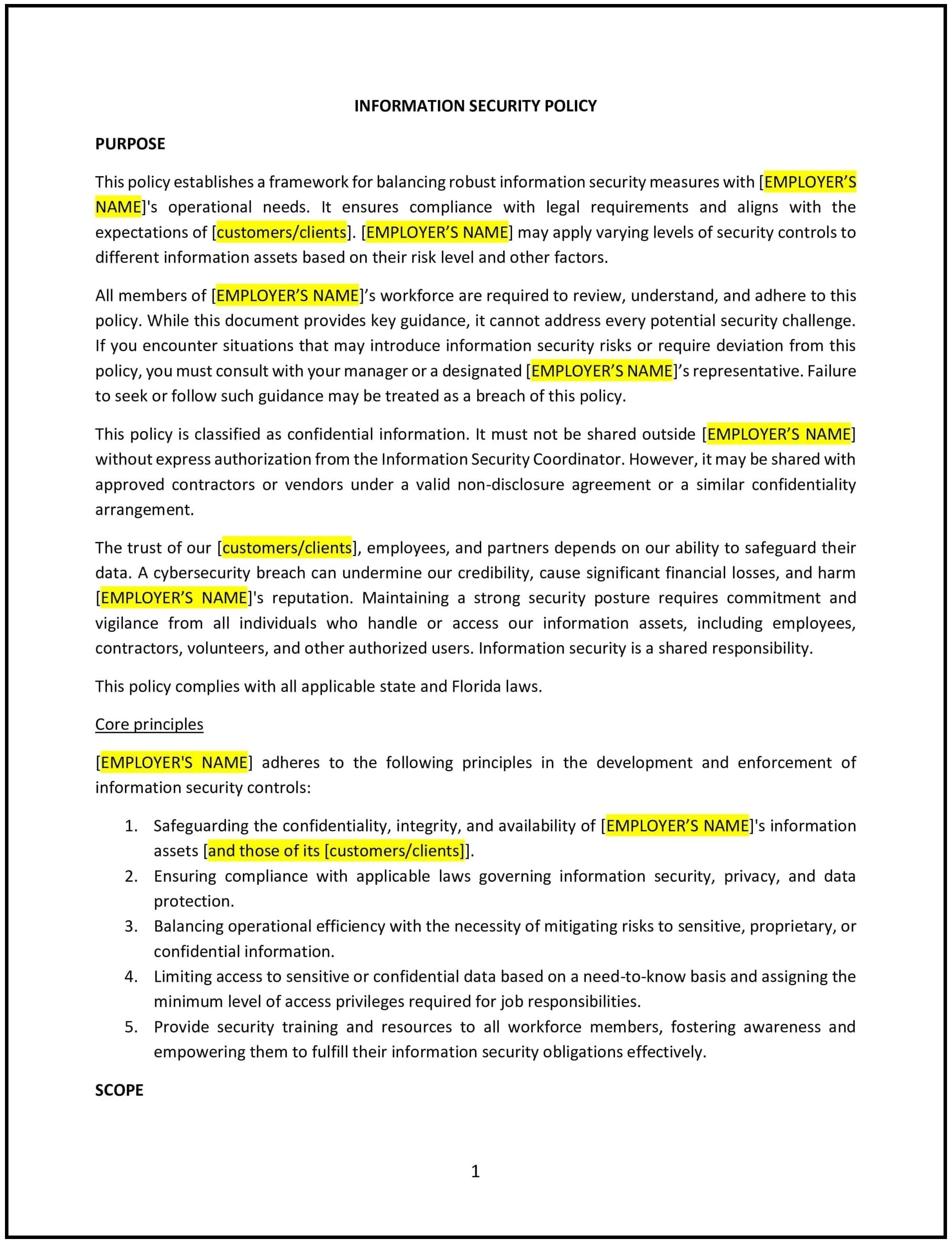Information security policy (Florida): Free template
Got contracts to review? While you're here for policies, let Cobrief make contract review effortless—start your free review now.

Customize this template for free
Information security policy (Florida)
An information security policy helps Florida businesses establish a framework for protecting sensitive data, systems, and assets from unauthorized access, breaches, or misuse. This policy outlines procedures for managing risks, implementing safeguards, and fostering a culture of cybersecurity awareness. It is designed to promote data protection, reduce vulnerabilities, and provide clear guidelines for maintaining the confidentiality, integrity, and availability of information.
By implementing this policy, businesses in Florida can demonstrate their commitment to safeguarding sensitive information, enhance operational resilience, and align with the state’s focus on protecting digital assets and privacy.
How to use this information security policy (Florida)
- Define sensitive information: Clearly specify what types of data are considered sensitive, such as customer information, financial records, or intellectual property.
- Establish access controls: Outline how businesses should restrict access to sensitive data, including user authentication, role-based permissions, and password requirements.
- Address risk management: Explain how to identify, assess, and mitigate risks to information systems, such as phishing attacks, malware, or insider threats.
- Provide training: Educate employees on recognizing security threats, following best practices, and reporting incidents promptly.
- Develop incident response plans: Specify steps to take in the event of a security breach, including containment, investigation, and communication protocols.
- Communicate the policy: Share the policy with employees through handbooks, emails, or training sessions to ensure awareness and understanding.
- Monitor adherence: Regularly review security practices and address any concerns or discrepancies promptly.
- Update the policy: Periodically assess the policy to reflect changes in technology, threats, or business needs.
Benefits of using this information security policy (Florida)
This policy offers several advantages for Florida businesses:
- Promotes data protection: Clear guidelines help prevent unauthorized access, breaches, or misuse of sensitive information.
- Reduces risks: Defined procedures minimize the likelihood of cyberattacks, data loss, or reputational damage.
- Builds trust: Demonstrates the business’s commitment to safeguarding customer and employee data.
- Aligns with community values: Reflects Florida’s emphasis on innovation, privacy, and responsible use of technology.
- Enhances reputation: A robust policy showcases the business’s dedication to ethical practices and operational resilience.
- Improves productivity: Secure systems reduce downtime and ensure employees can focus on their tasks without disruptions.
- Supports growth: A strong security culture attracts clients, partners, and talent who value data protection.
Tips for using this information security policy (Florida)
- Communicate clearly: Ensure employees understand the policy by providing written materials and discussing it during meetings or training sessions.
- Train employees: Educate staff on recognizing security threats, following best practices, and reporting incidents promptly.
- Use technology: Leverage tools like firewalls, encryption software, and monitoring systems to protect data and detect threats.
- Stay informed: Keep up with changes in cybersecurity trends, regulations, or best practices that may affect information security.
- Encourage feedback: Solicit input from employees to identify areas for improvement and ensure the policy meets their needs.
- Review periodically: Assess the policy’s effectiveness and make updates as needed to reflect changes in technology, threats, or business goals.